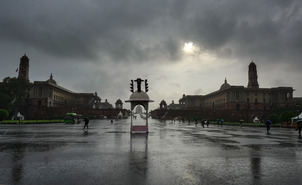Chinese foreign minister holds talks with Jaishankar today
The purpose of his visit to New Delhi is to resume physical engagement and to invite Prime Minister Narendra Modi for a BRICS meeting hosted by Beijing later this year.

New Delhi: Amidst Chinese incursion in Ladakh and Galwan valley, the Chinese foreign minister Wang Yi has arrived at Delhi to meet his Indian counterpart, S. Jaishankar and National security advisor Ajit Doval today.
The purpose of his visit to New Delhi is to resume physical engagement and to invite Prime Minister Narendra Modi for a BRICS meeting hosted by Beijing later this year.
Just before arrival at New Delhi, Wang Yi has made a remark on Kashmir at a program in Pakistan. India had rejected the remarks, calling them "uncalled for" and underscored that Jammu and Kashmir is an internal matter of India and both Pakistan and China know that.
The suspense over the visit persisted till the last minute and there was no official confirmation of the visit even when the Chinese minister landed in Delhi. The landing could be confirmed only through tracking the flight path of his plane, which took off from Afghanistan.
India-China relations have taken a downturn as Chinese incursions became more frequent in Ladakh and led to the clash in Galwan Valley in which 20 Indian and several Chinese soldiers died.
Both countries have held meetings at a military level for de-escalation of the tension at the border. Both countries have agreed for a disengagement process last year in the north and south banks of the Pangong lake and in the Gogra area. But there has been no return to the status quo that prevailed before 2020.
On March 11, India and China held the 15th round of military dialogue to resolve the pending issues. Mr Jaishankar had several rounds of talks with Wang Yi in Moscow and Dushanbe to defuse tensions, but no fruitful results come out from the talks.
Both India and China held talks in September 2020 at Moscow on the sidelines of a conclave of the Shanghai Cooperation Organisation during which they reached a five-point agreement to resolve the border row in eastern Ladakh.
They also had a bilateral meeting on the sidelines of another SCO meeting in Tajik capital city Dushanbe in July last year. Another meeting took place in September in Dushanbe.

















